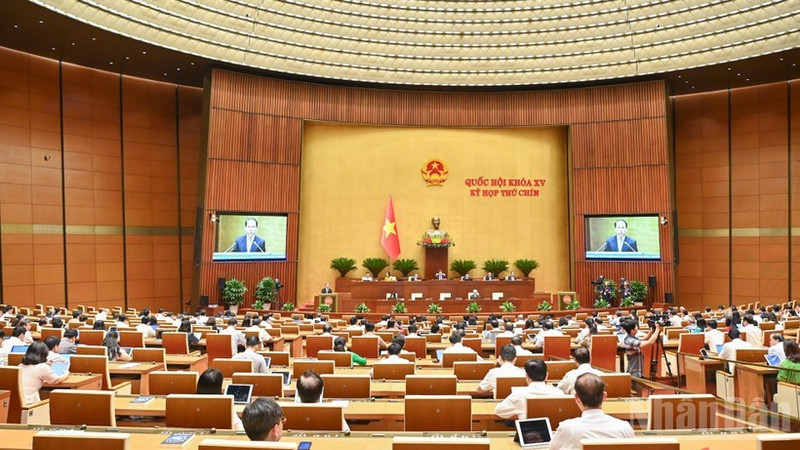
An overview of the discussion session in the hall on the draft resolution amending and supplementing a number of articles of the 2013 Constitution, June 13. (Photo: DUY LINH)
These are not only legal decisions but also strong declarations of the spirit of innovation, laying the foundation for the aspiration to bring Viet Nam to rise strongly in the new era.
These decisions, together with strategic thinking, unprecedented social consensus and long-term vision, promise to open a breakthrough period of sustainable and comprehensive development.
Innovative constitutional thinking
The Constitution, the original law of the country, is not only a legal framework but also a symbol of the people’s will and political identity. The amendment of the 2013 Constitution clearly demonstrated the spirit of institutional reform, affirming the consistent viewpoint of the Party and state: Development must originate from a modern, flexible, and effective constitutional foundation.
The highlight is the transition from a three-level government model to a two-level one (provincial and communal levels), aiming to streamline the apparatus, improve management effectiveness, and bring the government closer to the people.
According to delegate Nguyen Tam Hung (Ba Ria-Vung Tau delegation), this reform does not only change the form but is a “structural revolution”, cutting down on intermediate levels and avoiding overlapping functions and waste of resources. The new regulation in Article 110 on the organisation of administrative units is assessed as “flexible and sustainable”, opening a legal space suitable for the trend of urbanisation, development of special economic zones, and digital administration.
Many National Assembly deputies and voters commented that this is a testament to the constitutional thinking, which not only solves current problems but also looks to the future, ready to adapt to the constant changes of society.
The democratic spirit in the process of amending the Constitution is also a noteworthy highlight. With more than 280 million comments, reaching a 99.75% approval rate, the Constitution has truly become a document “of the people, by the people, and for the people”. The application of the VNeID digital platform to receive comments not only demonstrates transparency and efficiency but also affirms progress in linking democracy with technology.
National Assembly deputies had a heated discussion and supported maintaining the right of People’s Council deputies to question the Chief Justice of the People’s Court and the Chief Prosecutor of the Provincial People’s Procuracy. This is a testament to the democratic constitutional thinking, emphasising the role of controlling power from the grassroots, where the people’s voice resonates most strongly.
Unprecedented step
Along with the amendment to the Constitution, the resolution on the arrangement of provincial administrative boundaries, reducing from 63 to 34 units, is a breakthrough decision. This is not only an administrative reform but also an unprecedented “revolution of state organisation” in nearly 50 years.
The merger of provinces and cities not only streamlines the apparatus but also expands development space, creating conditions for synchronous planning and developing linked economic value chains.
Deputy Mai Van Hai (Thanh Hoa Delegation) and many other National Assembly deputies commented that restructuring boundaries is an opportunity for localities to rise strongly and become the nucleus of regional development. New larger-scale administrative units with better infrastructure will be the foundation for long-term economic development strategies.
However, reform always comes with challenges. Delegate Sung A Lenh (Lao Cai delegation) and many other delegates and voters expressed concerns about the feasibility in mountainous provinces with complex terrain and diverse ethnic cultures. He proposed that separate solutions are needed for each region, ensuring the preservation of cultural identity, stabilising community life, and investing heavily in connecting infrastructure.
Many National Assembly delegates made recommendations and solutions to ensure the implementation process is synchronous, effective, and sustainable. Opinions all emphasised the need to specify the transition mechanism, harmoniously resolving organisational reform and stabilising people’s lives.
Delegates recommended that the government should promptly issue legal documents to guide specific implementation in the spirit of amending the Constitution, especially laws on administrative apparatus organisation, budget decentralisation, and responsibility for power supervision. The reorganisation of local government must be accompanied by training of cadres, innovation in management methods towards modernity, openness and closer to the people, creating convenience for the people and the business community.
Delegate Pham Van Hoa (Dong Thap delegation) proposed that the government should issue support policies for affected cadres and civil servants, from subsidies and retraining to job transfers. Propaganda work, including flexible use of information channels from social networks to grassroots media, are key factors in creating social consensus, helping people understand the meaning of the reform, and garnering support.
Voters and people want authorities at all levels to focus on feasibility, consensus and clear monitoring mechanisms. Institutional reform is not only a legal action but also a process of social mobilisation, requiring the participation of the entire political system and the people.
The decisions at the 9th Session sent a strong message: institutional innovation is the key lever to turn aspirations into reality. This is an affirmation of the strategic vision, in which the people are not only beneficiaries but also the subjects who create the future of the country.
Amending and supplementing several contents of the 2013 Constitution and restructuring administrative boundaries in 2025 are not only legal milestones but indicate turning points in national governance thinking. As Viet Nam enters a new stage of development with fast, sustainable and comprehensive requirements, innovative constitutional thinking becomes a strong driving force, arousing the desire to contribute, be creative, and integrate.
This is a commitment for a Viet Nam on the path of development striving to build a democratic, civilised, modern, and effective society, whereby every decision is discussed and debated carefully and thoroughly towards the interests of the people and the strength of the nation.

Comment
Print